SÃO PAULO, Brazil – Latin American Church leaders will keep putting pressure on all governments in the region – and on the United States – to secure regular and safe crossing points on all borders for immigrants and refugees, said Elvy Monzant, executive secretary of the Latin American and Caribbean Church Network CLAMOR on Migration, Refugees and Human Trafficking.
“The national chapters of CLAMOR Network presented their work and discussed the realities they deal with. One of the most significant topics was the Darien Gap,” Monzant told Crux.
The organization is formed by 60 ecclesial organizations that work with migrants, refugees, and displaced people, and held its seventh general assembly in Bogotá, Colombia on Sep. 25-29 giving its main areas for action for 2025.
A vast area of rainforest between Colombia and Panama, the Darien Gap is one of the most risky points of the journey northwards taken by immigrants and refugees who come from South America and head for the U.S.
Besides the several natural perils, travelers encounter criminal organizations ready to kidnap, extort, and kill them. At the same time, networks of coyotes – many times connected to local gangs – charge money from the immigrants in order to help them cross the region.
Despite so many dangers, growing numbers of people have been crossing the Darien Gap over the past years. In 2023, more than half a million people traveled through the region. This year, at least 238,000 immigrants made that journey between January and August. Most of them come from Venezuela, but immigrants of several nationalities are commonly seen there.
In July, chapters of CLAMOR Network from Venezuela, Panama, and Colombia gathered in Darien in order to learn more about the problems faced by the immigrants there, Monzant explained.
“We interviewed immigrants and Church people who work in that context and could see the critical situation in that area,” he said. A documentary about Darien was presented to the participants of the assembly last week.
CLAMOR Network will keep accompanying Church organizations that work in such critical circumstances and making visible the dangers and the tragedies that commonly happen in regions like Darien, Monzant added.
In the meeting, participants talked about the need to keep struggling for the development of public policies to ensure the defense of the human rights of immigrants and refugees – no matter if they have papers or not. All across Latin America, states have been continually failing to protect and promote the social insertion of immigrants.
“We, who work with them every day, know that when a government decides to shut a crossing point on a border, the immigrants will rapidly open a new one – but the new one will raise the risks and the number of deaths, disappearances, and so on,” Monzant said.
Brazilian-born Sister Roselei Bertoldo, a member of the CLAMOR Network’s commission against human trafficking created last year, told Crux that it has been a growing problem in Latin America, with a special concentration in areas of massive fluxes of immigrants, like Central America.
“Drug trafficking gangs scattered all over the route to the U.S. have been associating with human trafficking agents, something that’s increasing the risks for immigrants and internal migrants,” she said.
Many immigrants end up trapped in the mechanisms created by such mafia-like organizations and are trafficked for labor or sexual exploitation, Bertoldo explained.
The commission developed a tool box against human trafficking, which was presented during the encounter. The idea was to gather different kinds of materials, all of them accessible on CLAMOR Network’s website, which can be used to raise awareness about the theme.
“We gathered texts, videos, and other materials in order to discuss human trafficking with the people. There’s the suggestion of a rosary for the victims of human trafficking, for instance,” Bertoldo said.
She said that there’s a significant underreporting of human trafficking cases in Latin America, something that makes it harder for the Church to combat it.
According to Bishop Moisés Atisha of San Marcos de Arica, a Chilean diocese near the border with Peru, there are no official numbers about it, so it’s still hard to deal with the problem.
“What we can presume is that immigrants are being exploited in workplaces and for prostitution,” he told Crux.
Atisha, as well as other bishops of dioceses on border zones, shared with the participants the reality the Church faces in his region. The border with Peru has been militarized since last year, something that complicates the lives of people who entered the country without documents in the past and now don’t find a way to leave it.
“But there’s much corruption and the people know when they can cross the border without being harassed, as long as they give money to the agents,” Atisha said.
Venezuelans keep getting into Chile in high numbers. Some of them later make the journey further north, accompanying Dominicans and Cubans who want to enter the U.S. That route used to be taken by Haitians – they arrived in large numbers in Chile a few years ago –, but now, the number of them has decreased, Atisha explained.
“Governments that prefer to build walls violate the immigrants’ human rights, even if they declare that they are democratic and humanists,” Monzant said.
He emphasized that every Catholic in the Americas should work to defend the lives of immigrants.
“I cannot be considered a real pro-lifer, for instance, if I fail to defend the immigrants the same way I defend an unborn child,” Monzant said, adding that Pope Francis said that “those who build walls cannot say they are Christian. Christians build bridges.”














